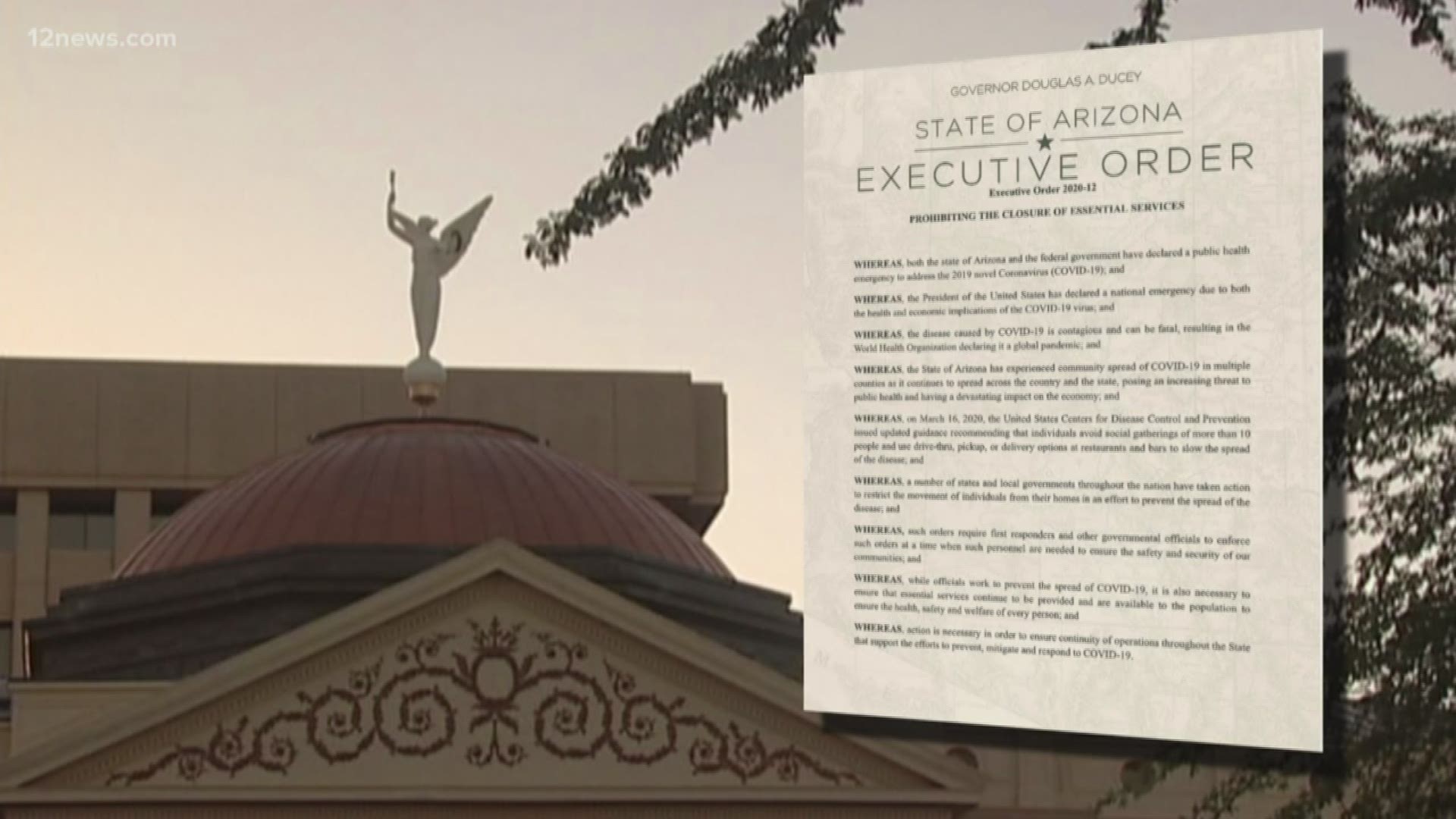PHOENIX — Gov. Doug Ducey issued a stay-at-home order for Arizonans that started at close of business March 31.
The order went into effect Tuesday, March 31, at 5 p.m. and will last until April 30, unless it's extended.
Here is what that means for you.
What can I leave home for?
Per the executive order, Arizona residents can leave home to:
- Go grocery shopping or pick up prescriptions
- To use any other services or produces provided by essential businesses
- Get equipment needed to work from home
- Seek medical, behavioral health or emergency services
- Care for a family member, friend or pet in another home
- Get outside for some exercise
- Go to work at an essential function
- To work at a non-essential business as long as that business is not open to the public
- Engage in constitutionally protected free speech or religious activities
If you are leaving home for any reason, you must engage in proper physical distancing. That means you stay at least six feet from other people wherever possible.
What is considered essential work?
Ducey laid out all the jobs considered "essential" in an executive order last week. It is a long list that includes hospitals, groceries, gas stations and even golf courses and more. On April 3, the governor updated the guidelines to close barbers, hair stylists, nail salons and other recreational activities.
The stay-at-home order does not change which services are considered essential. Here is the full list.
Governments at the city and county levels are not allowed to issue proclamations that change what Ducey has designated essential services.
How will this be enforced?
Anybody who knowingly violates the executive order is guilty of a class 1 misdemeanor, according to Arizona law. However, the order says that people will be notified and given an opportunity to comply "prior to any enforcement action being taken."
Nobody will be required to provide documentation proving essential activities while they are away from home, so it is unclear how non-compliance will be determined or what exactly the enforcement mechanism will be, despite what Ducey told reporters Monday.
What is the difference between 'stay-at-home' and 'shelter-in-place'?
Other states like California have "shelter-in-place" orders in effect. We have a "stay-at-home" order. Both of these terms mean essentially the same thing: Don't leave your home unless absolutely necessary.
Ducey said it's just a matter of semantics.
"When you use words like 'shelter in place,' that's what happens during a nuclear attack. That's what happens when there's an active shooter. We want people to stay at home. It'll have the same type of effect," he said.
No matter what you call it, the directive is not a total lockdown. Grocery stores and pharmacies are still open, and people can leave their homes for some fresh air and exercise as long as they stay six feet apart from each other.
What counts as an essential business may vary from state to state. For example, beauty salons are closed in several other states with stay-at-home orders.
How those orders are enforced can also change depending on what state you're in.
Can I leave the state?
The federal government can limit interstate travel, but other than a Centers for Disease Control and Prevention travel advisory strongly urging residents of New York, New Jersey and Connecticut to refrain from unnecessary travel, no further restrictions have been imposed.
Some governors have imposed 14-day quarantines for travelers from other states, but that isn't the case here in Arizona.
Can I still move out?
Moving and relocations services are considered essential businesses and remain open, so if you had previously planned to move homes, you can still do that.
Can I use public transportation?
Public transportation will still run, but the executive order asks people to only use it when absolutely necessary.
Riders are to remain at least six feet from other riders and from drivers "to the extent possible."
What about homeless people?
People experiencing homelessness are exempt from the stay-at-home order but are urged to find shelter as soon as possible.
What about other situations?
Hotels, motels and shelters count as homes under the executive order.
Domestic violence survivors may also leave home if it is unsafe and shelter in a different location.
Here is where you can find resources if you or a loved one feels unsafe at home.

